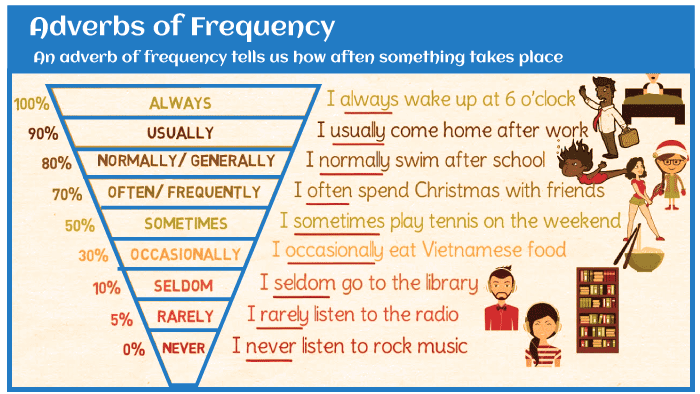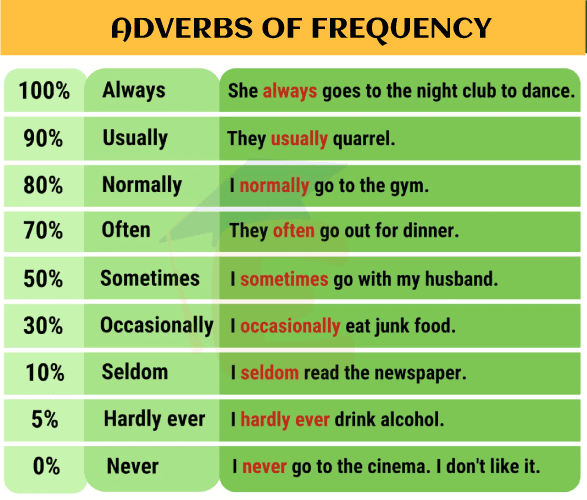Adverbs of FrequencyOverviewThere are various kinds of adverbs. Among the various kinds of adverbs, adverbs of frequency tell us is how frequently the action stated in the sentence has occurred. Furthermore it informs us about its frequency. Read on to know about adverbs of frequency, its meaning addresses definition, and usage. Examples have also been provided to help you understand the concept. What is Adverbs of Frequency?
An adverb of frequency is a term utilized in a sentence to provide additional information regarding a verb, adjective, or another adverb. Adverbs of frequency can be positioned after the noun or pronoun that serves as the subject or prior to the verb if the statement contains only one verb. If a sentence contains more than one verb (e.g., auxiliary verb), the adverb of frequency can be placed preceding the main verb. This is a type of adverb which affects or clarifies the meaning of the phrases by informing us how often or frequently some-thing occurs. Adverbs of frequency usually convey how frequently something happens, either definite or indefinitely. Weekly, daily, hourly or yearly are instances of adverb which define or describe definite frequency. An adverb denoting indefinite frequency does not identify a certain time range; examples include: occasionally, frequently, and infrequently. Types Of Adverbs of FrequencyAdverbs of frequency are classified into two types: indefinite and definite. Indefinite frequency adverbs do not indicate a time period. Terms such as 'rarely,' 'often,' 'always,' 'never,' and' sometimes' are among them. The quantity of time described by these terms is ambiguous since it is dependent on the context in which they are used. As you might have guessed, definite adverbs of frequency always indicate a period of time. These comprise of phrases such as 'hourly,' 'daily,' 'weekly,' and 'yearly,' all of these specify a specific amount of time. As a result, the title. 
Position of Frequency AdverbsPosition of adverbs of frequency is crucial for understand the concept. Adverbs of frequency are frequently placed in these adverb positions in the sentences. Let us have a look at the possibilities of position; Position 1: The majority of adverbs appear before the verb. Examples of the same are:
Position 2: Utilize frequency adverbs following these five forms of be: am, is, are, was, and were. Examples of the same are:
Position 3: Whenever a verb has a helping verb, the adverb appears following the first part of the verb. Examples of the same are;
Position 4: Frequency adverbs frequently appear at the start of sentences. Examples of the same are;
Position 5: Frequency adverbs are sometimes used at the conclusion of a sentence. Examples of the same are;
Rules of Adverbs of FrequencyThese simple principles for frequency adverbs may assist you in utilizing them properly:
Adverbs of frequency come before regular verbs. The adverb is highlighted for ease of recognition.
Adverbs of frequency are positioned AFTER auxiliary verb. (Be, have, do, can, could, must, might, need to, ought to, may, should, shall, will, and would) and BEFORE common verbs.

Several frequency adverbs can be used at the start of a sentence to emphasize the adverb itself: occasionally, frequently, sometimes, normally, usually.
The adverbs never, ever, seldom, always, seldom, and scarcely CAN NOT be used at the start of a sentence. As a result, the following ordering is incorrect: Always I go to college. - Incorrect Seldom I buy momos. - Incorrect Rarely we go for shopping- Incorrect The Question Form 'How often...?' is a common phrase used to ask about frequency. As an example:
However, it is also feasible to ask inquiries using only an adverb of frequency. As an example:
Frequency Adverbs Along Modal Verb and Auxiliary VerbIt is important to remember there is the modal verb in the phrase by placing the adverbs of frequency after it and prior to the primary verb. As an example: We must always give our best effort. People can usually grab a seat on our metro. They should never be rude and unhelpful. The same pattern applies to auxiliary verbs - the frequency adverb comes between the auxiliary verb and the primary verb. As an example:
Difference Between Adverbs of Frequency and Adverbs of TimeThe key distinction between an adverb of time and a frequency is that an adverb of time denotes when or for how long an event occurs or will occur.
Adverbs of frequency describe how often or simply how often an action occurs.
The most noticeable distinction between adverbs of time and adverbs of frequency is that adverbs of frequency provide additional information on how frequently an activity occurs rather than when it occurs. 
Adverbs of Frequency ExamplesEach phrase/ sentence includes an instance of a frequency adverb; the instances are highlighted for easy identification.
Next TopicAdverbs of Manner
|
 For Videos Join Our Youtube Channel: Join Now
For Videos Join Our Youtube Channel: Join Now
Feedback
- Send your Feedback to [email protected]
Help Others, Please Share









